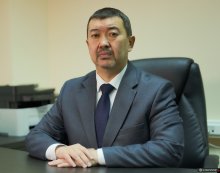
On January 16, 2020, Chairperson of the Senate of the Parliament of the Republic of Kazakhstan Dariga Nazarbayeva held a meeting of AIС Committee.
Chairman of the Board of NASEC JSC Toleutai Rakhimbekov believes that the main problem of agricultural science in Kazakhstan is the lack of a system of knowledge transfer, technologies transfer and commercialization. In this regard, T. Rakhimbekov proposed to restore the system of rural information and consultation points (RICP) in the regions on the basis of regional agricultural colleges and chambers of entrepreneurs.
The Chairman of the Board of NASEC JSC highlighted the problem of personnel shortage in agricultural science and emphasized that often graduates of specialized universities do not work in their specialty.
“Today, our Center has begun the transformation of agricultural science. Among the measures implemented: reducing the number of institutes by transferring most of them to universities, increasing the number of experimental farms to 40 by attracting the best private agricultural organizations, increasing the share of the cost of experimental work to 40%, moving from financing research institutes to financing scientists, allocating budgetary funds for the transfer and commercialization of technologies, the creation of laboratories for collective use, the introduction of an independent examination of science, the change in the functionality of experimental farms,”- T.Rakhimbekov noted.
Experimental farms will become the basis for the implementation of scientific topics, studies of undergraduates and doctoral students, internship of students and classes within the extension.
T. Rakhimbekov: “We have proposed key changes in the field of scientific and educational activities of research institutes and universities. They include the transformation of agricultural universities into research universities, an increase in the share of time spent by scientists of research institutes for teaching activities up to 20%, and for teachers of universities for scientific activities up to 30%.”
“We have begun work on the commercialization of research results. The science transfers its results to the Center for Transfer and Commercialization of Agricultural Technologies. The Center making licensing agreements with farmers and receives royalties from them for the use of intellectual property. Scientists will be paid 30% of the amount of royalties, research institutes will be transferred 30%, 40% will be credited to the Fund for New Research,” - Rakhimbekov said.
At the end of October, the Law on Amendments and Additions to Agricultural Law was signed. In particular, it provides for subsidizing the costs of research for farmers. It aroused great interest among farmers and scientists.
“Our Center will conclude contracts with farmers for research, place an order among scientists and research institutes and pay for scientific work. Up to 80% of the costs of farmers will be subsidized. Intellectual property rights will belong to the Center and scientists, it further will continue to be realized in the market among other customers. This will allow attracting additional funds to science,”-T. Rakhimbekov noted.
“Last year, Elbasy instructed to create a system of training rural residents in housekeeping skills. We are creating a three-tier system: at the republican level, these are our three universities, as educational and methodological centers, at the regional level - research institutes and pilot farms, at the regional level - on the basis of agricultural colleges, former rural vocational schools. This does not require large budgetary funds. In total, we plan to create more than 200 Centers of dissemination of knowledge,” -T. Rakhimbekov said during the speech.
Chairman of the Board of NASEC JSC also separately focused on the problem of shortage of staff in agrarian science and stressed that often graduates of specialized universities do not work in the specialty.


